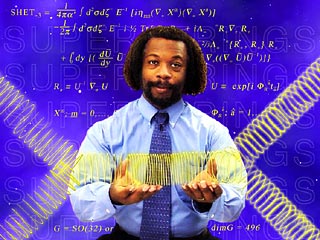� Fearless | Main | Patches �
September 09, 2004
Sylvester James Gates, Jr.
 Pops hipped me to SJ Gates who is apparently keeping it right.
Pops hipped me to SJ Gates who is apparently keeping it right.
Sylvester James Gates, John S. Toll Professor of Physics at the University of Maryland, College Park, told a radio audience of African American children and their families that they should strive to find the playfulness in science and math, and to understand the role of physics in everything from cell phones to space travel.
"What I would like most for your audience to understand is that (science) belongs to them," said Gates during an interview on a radio program called Delta SEE Connection. "You see for me, all of the mathematics I know, and all of the physics that I understand and the equations that I deal with � for me this is like a basketball and a court. When I go out and do science, I am having fun. I'm doing the thing that's truest to being me. And as an African American I am not separated from this. This is so much a part of me that it's like my listening to music; it is like watching Michael Jordan play or watching Venus or Serena�"
To produce Delta SEE Connection, a weekly radio program, AAAS has joined forces with the nation's largest African American sorority, Delta Sigma Theta Sorority, Inc., and the Delta Research and Educational Foundation (DREF).
Posted by mbowen at September 9, 2004 10:04 AM
Trackback Pings
TrackBack URL for this entry:
http://www.visioncircle.org/mt/mt-tb.cgi/2487
Comments
Thanks for the details on Gates.
I agree that it's very important to discuss the sciences with our children. I fondly rememeber playing a geography game with Danae during the opening ceremonies of the Olympics last month. As each country entered the stadium in Athens, an athletic representative held a sign aloft displaying the nation they represented. Danae and I sat in front of the TV with a globe and a world atlas. "Camaroon!" We flipped to the right page and searched frantically to find the West African nation. We repeated the "game" subsequently many times.
I must admit that a few times we had to turn to the glossary at the back to find certain Pacific Island nations and a few Eastern European nations as well. But it was a great experience...especially when we actually caught up to the procession and could rest for a minute as the huge German or Italian or Chinese contingent entered the arena.
Last night, Danae asked Kay if the Earth was a spiral(?). I can hardly wait until tonight so I can give her an geological and astronomical lesson.
Bryan B.
Posted by: Bryan Bowen at September 9, 2004 11:02 AM
That's very cool. We're just getting into the swing of school things this week. I'm definitely going to try something like that.
When I got standardized test scores back, my kids did well with probability. I know that I consciously advocated that they play cards, rochambeau, roll dice and flip coins. It has paid off. It also helps when they ask you for something and your answer is 'perhaps'.
Also don't forget these tools.
Posted by: Cobb at September 9, 2004 12:12 PM
This guy rocks. Thanks for the links, I'm going to pass this along to my science teacher hubby :)
Posted by: caltechgirl at September 9, 2004 01:51 PM
Black futurists, such as myself, ALWAYS stress how important it is to get black children interested in the sciences. It is something that many black parents just don't get and need to get. Science opens your mind to so many possibilities. Reason why I became a futurist. :)
Posted by: T-Steel at September 9, 2004 02:44 PM
Thank you for pointing him out!
She-who-must-be-obeyed and I have enough of a time working with our oldest, especially, in trying to get her to see that what she is doing in school has "real world" importance beyond high school -- especially in terms of math and science...
Posted by: mhking at September 10, 2004 04:36 AM
My kid did well in English but not well in math. She struggled a bit. In high school, things switched. She tore up math and fell some in English.
Her appreciation for math and science happened once she had the chance to do hands on things in the area. Previous trips to science muesuems and the like didn't do it. The classwork did it.
It leads me to think that the make up of the child is what triggers the interest in math and science.
Posted by: DarkStar at September 10, 2004 06:02 AM
...that and different learning styles. If schools can offer a mix of styles so that each kid has the opportunity to latch on to one that works for them, we'd all be the better for it.
Posted by: memer at September 10, 2004 03:40 PM
As a math geek, I'm loving it! Thanks for posting this.
Posted by: Juliette at September 11, 2004 07:52 PM
what up dawgs
Posted by: jay at January 27, 2005 02:38 PM